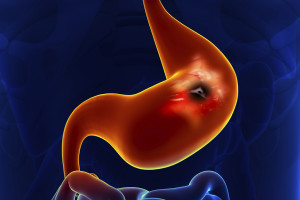
Forget everything you’ve heard about ulcers being caused by stress and spicy foods.
It’s a myth.
“Stress can put you at risk—and so can hospitalization—but the actual cause of most ulcers is a bacteria called helicobacter pylori, commonly called H. pylori,” said Spectrum Health gastroenterologist Randall Meisner, MD. “Another common cause is using anti-inflammatory agents like aspirin and ibuprofen.”
Ulcers are sores inside your digestive system or stomach. They cause a variety of symptoms, such as gnawing pain, nausea, burping, blood in the stool or vomit, feeling full, or unexpected weight loss.
“For some people, the abdominal pain gets worse with eating, and others feel better when they eat,” Dr. Meisner said. “It depends on where the ulcer is located.”
There’s about a 50/50 chance that H. pylori is lurking in your gut, but it may or may not give you an ulcer or gastritis, an infection in the lining of your stomach. Because it’s a carcinogen, in rare cases it may even cause cancer.
Although scientists aren’t sure why some people get sick and others don’t, they know the H. pylori bacteria comes from contact with vomit or stool or from unsafe water or food that wasn’t prepared properly.
If you need to be checked for H. pylori, there’s a simple breath test that takes only 15 minutes. Your doctor may want to test your stool, check your blood or refer you for an upper endoscopy to perform a biopsy of your stomach lining.
If you’re taking a proton pump inhibitor or medicine to reduce stomach acid, let your doctor know because these medications may affect the results.
Treatment usually involves antibiotics, a proton pump inhibitor, and often bismuth (think Pepto-Bismol).
Considering the dangers, should you be screened to see if you have H. pylori in your system?
“That’s a good question. There’s no screening protocol to randomly test people,” Dr. Meisner said. “But if you have symptoms like abdominal pain or an upset stomach, you should be tested and get treatment. If H. pylori is causing problems, it’s important to eliminate it.”
 /a>
/a>
 /a>
/a>
 /a>
/a>